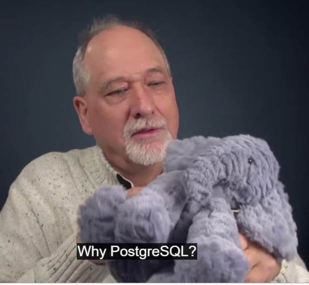| Postgre SQL For Everybody - New On Coursera Plus |
| Written by Sue Gee | |||
| Tuesday, 18 May 2021 | |||
|
There's a brand new Specialization on Coursera that will take you from basic to advanced SQL skills using PostgreSQL, the highly popular open source SQL database. Disclosure: When you make a purchase having followed a link to from this article, we may earn an affiliate commission. The Postgre SQL For Everybody Specialization comes from the University of Michigan. It has been devised and is taught by Charles Severance, a.k.a. Dr. Chuck, who will be well known to many from his other courses including the Python for Everybody Specialization. This new specialization is at intermediate level and participants are expected to have a basic understanding of Python, equivalent to completion of the first two courses of Python for Everybody. In the Welcome video of the first course Dr Chuck explains how in the other courses he teaches he repeatedly covers basic SQL and that students have often told him that they like the SQL part of the classes and have asked for more. He also addresses why he has chosen PostrgreSQL as the open source database on which to base the class. It is worth repeating his concluding remarks: I have taken a look at Postgres and I'm happy with what I see. The Postgres community is a very, very good open source community. ...They have been doing this for 20 years and it is an advanced SQL database. It's solid, it scales. Amazon bases its stuff on Postgres, and so it is time, I think, for us to take a really serious look at Postgres. So I'm happy that my first foray into advanced SQL is to introduce you to Postgres. So I hope that you will be as big a fan of Postgres as I am once this course is complete. Earlier this year we reported that PostgreSQL Is DB-Engines DBMS of the Year For 2020 and while Postgres might not be the first database that comes to your mind having heard Dr Chuck itemize the competition I can see why it has risen to be top of the popularity stakes and a great choice for a deep dive into SQL techniques. There are four courses in the specialization, each of which is billed as a 4-week course at an average of 3 hours per week.
While you can audit all of the videos and other material of the courses in this specialization for free, if you want to participate in the graded exercises and gain certificates for each of the courses you complete and eventually for the entire Specialization you need to Enroll, paying a monthly subscription until complete it. You can start with a 7-day free trial which lets you discover that the course fulfills your expectations. Financial aid is available and the Postgre SQL For Everybody Specialization and its component courses are also included in Coursera Plus, the subscription that gives access to 3,000+ of Coursera courses, which is the majority of those available. Coursera Plus, which means you can enroll in several courses simultaneously and therefore takes away all the angst of trying out new things when you have to pay for each course separately, Subscriptions are available on a Monthly basis, costing $59 per month which you can cancel at anytime or as an Annual subscription, costing $399 for a whole year. In both cases you can start with a 7-day free trial and remember that many employers are happy to reimburse the cost of a Coursera Plus subscription. Postgre SQL For Everybody appears to be very popular, attracting high ratings. Already over 2000 students have enrolled in the Specialization and over 3,500 on the first of its courses. It is self-paced so as soon as you Enroll, or start to audit it, you can dive in without delay and discover why others think it so good.
More InformationPostgre SQL For Everybody Specialization Python for Everybody Specialization Related ArticlesPostgreSQL Is DB-Engines DBMS of the Year For 2020 Coursera For New Year-Long Opportunity To be informed about new articles on I Programmer, sign up for our weekly newsletter, subscribe to the RSS feed and follow us on Twitter, Facebook or Linkedin.
Comments
or email your comment to: comments@i-programmer.info |
|||
| Last Updated ( Tuesday, 25 February 2025 ) |





